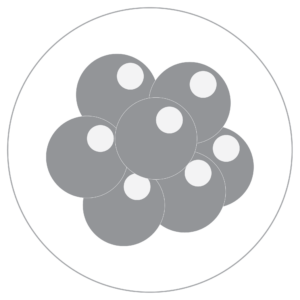
How do cells in different parts of an embryo come to express very different sets of genes? How do different types of developing cells become arranged in functionally significant spatial patterns? How are such developmental processes programmed in the genome? These are a few of the questions that fascinate developmental biologists and that are being answered in detail by the application of the powerful techniques of modern cell and molecular biology.
The Developmental, Regenerative, & Stem Cell Biology program (DRSCB) at Washington University provides students with opportunities to examine fundamental problems of development in a wide range of model systems. Students and faculty in DRSCB employ a combination of genetic, cytological, immunological, microsurgical and biochemical approaches in elucidating the molecular mechanisms underlying developmental processes.
The organisms chosen for investigation vary enormously in their complexity. Some students study development in simple organisms such as yeasts or slime molds in the hope that it may be easier to trace the developmental pathway that leads from genotype to a differentiated phenotype with single-celled organisms. Others choose to study development in fruit flies or nematodes because of the relative ease and speed with which the genes and gene products may be identified and studied. In addition, several laboratories study development in larger organisms – such as vertebrates or higher plants – either because of the intellectual challenge presented by these complex developmental systems, the desire to contribute to a solution to human problems like cancer or starvation, or both.
Students in the Developmental, Regenerative, & Stem Cell Biology (DRSCB) program will typically take five (5) to six (6) courses during their first year. Students will also participate in three laboratory rotations over the fall and spring semesters of Year 1 prior to selecting a thesis lab. Students are expected to complete the following coursework during their entire graduate education:
DBBS required courses
Graduate Research Fundamentals
Ethics and Research Science – typically taken in Year 2
Program required courses
Nucleic Acids and Protein Biosynthesis
Fundamentals of Molecular Cell Biology
Developmental Biology
Advanced Genetics
Advanced elective
Students may select one (1) or more, subject to approval by DRSCB Steering Committee
Molecular, Cell and Organ Systems
Immunobiology I
Immunobiology II
Genomics
Macromolecular Interactions
Molecular Microbiology & Pathogenesis
Journal clubs
Students may select one (1) or more based on interest
Molecular Mechanism of Aging Journal Club
Extracellular Matrix & Cell Matrix Interactions Journal Club
RAD (Regeneration, Aging and Development) Journal Club
Genetics Journal Club
Experimental Hematopoiesis Journal Club
Ion Channels Journal Club
Cancer Biology Journal Club
Experimental Skeletal Biology Journal Club
Current Research in Chromatin, Epigenetics and Nuclear Organization
Tropical and Molecular Parasitology
Molecular Microbiology & Pathogenesis Journal Club
Hematology/Oncology Journal Club
DNA Metabolism
Genetics & Development of C. Elegans Journal Club
Seminar in Computational Molecular Biology Journal Club
Qualifying exam
In the spring/summer semesters of Year 2, students must pass a Qualifying Exam (QE). Following a successful QE defense, students will identify and finalize their committee and complete their thesis proposal by December 31 of Year 3.
Thesis committee, proposal, and defense
In the summer and/or fall semesters of Year 2 after rotations are completed, students will select a thesis advisor and begin working in their thesis labs. Students will then select a thesis committee and complete their thesis proposal. Students will complete their thesis research, defense, and graduation over the rest of their graduate career. Most students graduate within five (5) to six (6) years of beginning their program.

DRSCB graduates pursue a variety of careers. Most program graduates go into academia, but many find paths in industry, government, and other fields, like science communication, law, and business and entrepreneurship.
Faculty Co-Directors:
Graduate Program Administrator: